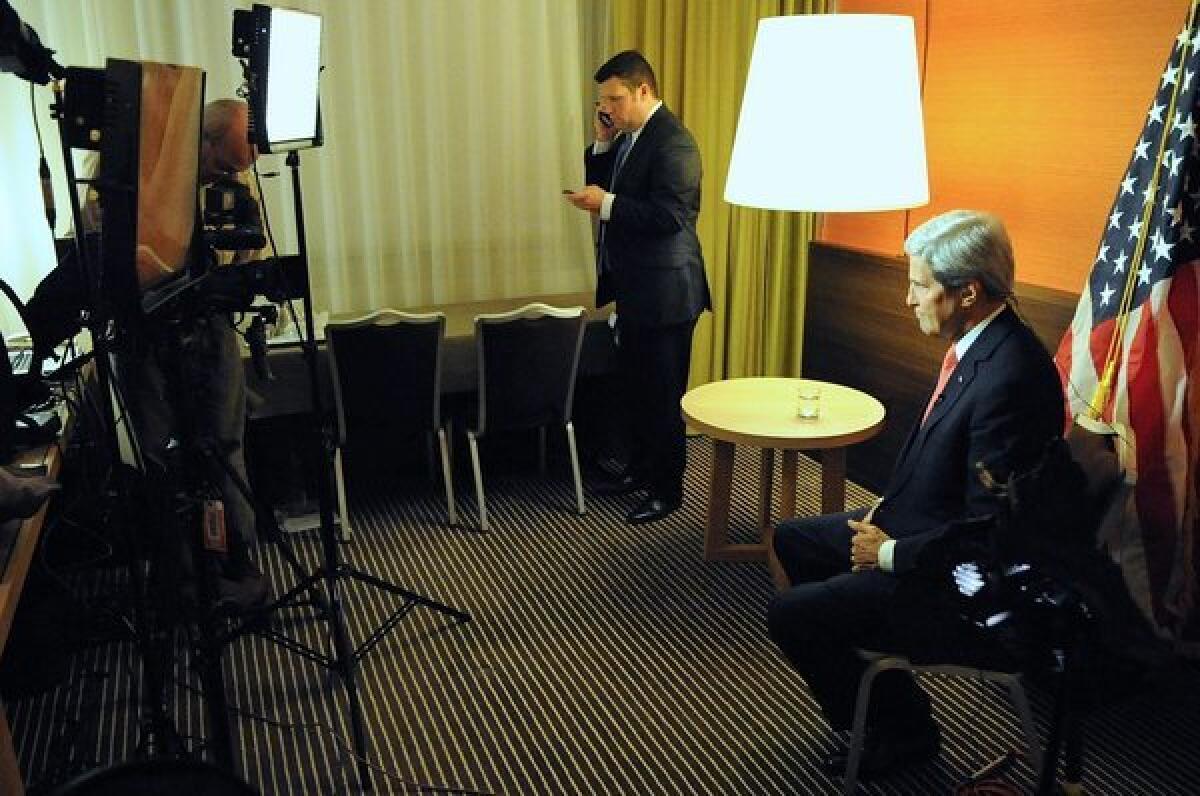Congress appears willing to give Iran deal time to work

- Share via
WASHINGTON — Secretary of State John F. Kerry opened the administration’s efforts to sell its interim agreement with Iran as key members of Congress signaled skepticism but a willingness to allow the deal to proceed.
Amid Israeli denunciations of what Prime Minister Benjamin Netanyahu called a “bad deal,” Kerry stressed that the agreement would bolster Israel’s security because it includes extensive new inspections that will give the U.S. and its allies far more information than before on Iran’s activities. The deal would freeze Iran’s nuclear program in place and roll back some elements of it while further negotiations take place, he said.
“None of this is based on trust. It’s not a question of trust. It’s a question of having the verification and the intrusive inspections,” Kerry said on CNN, one of several television appearances as he made the rounds of Sunday morning interview programs.
Critics should compare the plan with the available alternatives, not with a hypothetical ideal outcome, Kerry added.
“This negotiation is not the art of fantasy or the art of the ideal. It’s the art of the possible,” Kerry said in an interview with ABC’s George Stephanopoulos. The alternative “if you didn’t do what we’re doing, they would be marching forward” with the nuclear program and “moving closer to a weapon.”
Because of the agreement, “we will now be able to have greater inspection, greater knowledge, greater restraint, and that will expand the amount of time it would take for them to break out and create a nuclear weapon. That makes Israel safer. That makes the region safer,” Kerry said.
The Obama administration wants Congress to hold off on any new sanctions against Iran, fearing that additional legislation might blow up the agreement. Despite strong attacks on the deal from the Israelis and some conservative groups in the U.S., initial reaction from Capitol Hill indicated that the administration may achieve that goal.
Republicans and some Democrats, particularly those with close ties to Israel, expressed skepticism. But most of the reaction was relatively mild, with even many critics suggesting that Congress would hold off on any new sanctions for at least the next six months.
Sen. Dianne Feinstein (D-Calif.), the chair of the Senate Intelligence Committee, and Carl Levin (D-Mich.), the head of the Armed Services committee, both of whom have long records of supporting Israel, issued statements praising the deal.
Levin called it “a realistic, practical way to freeze Iran’s nuclear program for six months while we seek a long-range diplomatic end to Iran’s nuclear weapon ambition.”
“There is no harm in testing Iran’s willingness,” Levin said, noting that sanctions could be ratcheted back up if Iran fails to meet the terms of the deal.
Feinstein called the agreement “a giant step forward” and said it “should not be undermined by additional sanctions at this time.”
Her Republican counterpart on the intelligence panel, Sen. Saxby Chambliss (R-Ga.), offered a more critical assessment but a similar bottom line.
“For the next six months, it looks like this deal is going to be in place,” he said in an interview with Stephanopoulos, adding that Congress should move ahead with tougher sanctions, but on a deferred basis.
“I think you’re going to see a strong movement in the United States Senate to move ahead to tighten sanctions,’’ Chambliss added. “It may be we have to pass a resolution that puts sanctions on effective three months, four months, six months.”
Senate Foreign Relations Committee Chairman Sen. Robert Menendez (D-N.J.) also suggested that Congress would move ahead with new sanctions that would be held in reserve in case Iran fails to abide by the agreement.
The deal gave Iran too much relief from sanctions in exchange for relatively little rollback of its nuclear program, Menendez said in a statement.
“I expect that the forthcoming sanctions legislation to be considered by the Senate will provide for a six-month window to reach a final agreement before imposing new sanctions on Iran, but will at the same time be immediately available should the talks falter or Iran fail to implement or breach the interim agreement,” he said.
In the House, Foreign Affairs Committee Chairman Rep. Ed Royce (R-Fullerton) called for toughening sanctions. “We just feel more pressure needs to be brought on Iran rather than make this deal and take the pressure off of Iran,’’ Royce said in an interview on Fox News.
But Speaker John A. Boehner issued a notably mild statement that expressed doubts about the deal but did not propose any immediate steps that might try to undo it.
“The interim deal has been and will continue to be met with healthy skepticism and hard questions,” Boehner (R-Ohio) said in a statement. “Iran has a history of obfuscation that demands verification of its activities and places the burden on the regime to prove it is upholding its obligations in good faith while a final deal is pursued.”
Boehner stressed the need to “preserve the strong international sanctions regime” until a final deal can be negotiated. But his statement said nothing about imposing new sanctions on Iran immediately, as hard-liners have been advocating.
ALSO:
Afghan council defies Karzai on U.S. security deal
Rich-vs.-poor nations’ clash stalls work toward 2015 climate pact
China ups ante in conflict with Japan with new air defense ID zone
richard.simon@latimes.com
More to Read
Sign up for Essential California
The most important California stories and recommendations in your inbox every morning.
You may occasionally receive promotional content from the Los Angeles Times.











